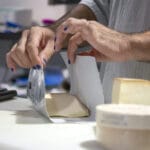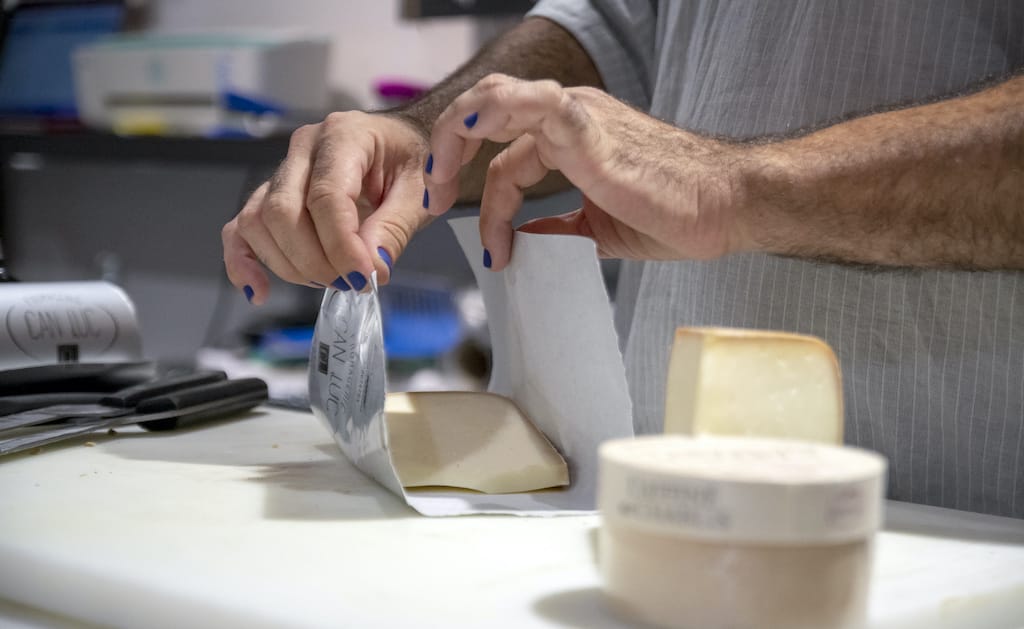During our visit to Mescladís Borrel Restaurant & School, Victoria Gio, coordinator of the Mescladís program, is on the phone for a long time. She smiles and looks around trying to find someone – she has good news for one of the students. It is Ibrahima, a tall, shy student from Senegal who at the moment is concentrated on preparing bissap, a delicious hibiscus flower infusion that is served as cold refreshment in the Mescladís restaurants. Ibrahima has secured a job in a local restaurant, and together with Gio will start the process to help him to arrange all the documents he needs. We congratulate him.
Ibrahima will join fellow Mescladís alumni like Makan, Mamadou, Masylla, Amyn, Zakarias, Moha and Yassim, all migrants who this year have found work in restaurants across the province of Barcelona. As Chakir, a graduate of the program from Morocco and current head chef of the Mescladís del Pou restaurant, says, “Mescladís is a huge door that many people crossed through and changed their lives, from one side to the other.”
Fundació Mescladís, which translates directly as “Mixture Foundation,” is just that – a mix of three restaurants, a cooking school, a catering service, a diversity of culinary workshops, a number of street art projects, and even an employment agency specialized in hospitality called Empleadís. This foundation, started in 2005 by Argentinian Martin Habiague, is a multifaceted initiative that provides tangible and sustainable economic programs – particularly in the form of hospitality job training – to people at risk of social exclusion, with a focus on migrants and refugees, in the city of Barcelona.
As an Argentinian in Spain and the grandson of Spaniards who emigrated to South America, Habiague feels strongly that migration should be supported, not persecuted. “Migration is a human right, and we defend this right,” he says. “From 2014 until today, more than 20,000 people have died or disappeared in the Mediterranean because they didn’t have the same conditions and support that my grandparents had when they migrated from Spain and Italy to Argentina in the mid-20th century.”
“Migration is a human right, and we defend this right.”
The heart of Fundació Mescladís is its social and culinary educative program Cuinan Oportunitats (“Cooking Opportunities”), a holistic project that trains around 120 students every year in a complete circuit of cooking and room service, preparing them to be versatile candidates for jobs in restaurants and hotels. Victoria explains that after this process, participants go on to complete 120 hours in other Barcelona restaurants and hotels to consolidate their learning, create their own professional contacts and try to secure a job contract.

“Our project is social and professional inclusion, and if there is not a job, there is not social inclusion at all,” she says. “The right to work, the right to migrate and the right to a living wage is fundamental, and it is the key that gives meaning to everything else.” In order to make a deeper impact, the foundation also works with a wide network of other organizations, from governmental and private institutions that directly help migrants in need of assistance, to city restaurants and hotels that employ the foundation’s graduates.
The first restaurant integrated into the project was Mescladís del Pou, a colorful, open-air terrace in the Born neighborhood, which has grown to be the foundation’s most well-known location. The space itself exists in a kind of “mixed” zone, nestled in between the hip, touristic Born area, and Barri de Sant Pere, a more modest neighborhood which is home to many immigrant families. The restaurant is integrated into the public neighborhood community center Casal de Barri Pou de la Figuera. It was here, in 2006, that locals reclaimed a square slated for development, eventually turning it into a community garden and play area for all to use, which now makes up the surroundings of the Mescladís terrace.

In 2019, the foundation opened Restaurant-School Mescladís, located in Carrer Comte Borrel in the Eixample neighborhood, with improved facilities for the Cuinan Oportunitats program. In this space, the restaurant and the school are connected by a simple corridor where students and customers can cross paths. The most recent incorporation to the Mescladís family was Mescladís Sant Lluc in 2021, a lovely café space inside the centenarian arts center Cercle Artistic de Sant lluc. The center was founded in 1893 and is located in the historic Palau Mercader building in the Born neighborhood, very close to the Santa Caterina Market.
The three restaurants allow the school to have more students rotating as chefs and waiters during the training process, gaining experience in both the kitchen and on the floor. The spaces currently share a similar culinary offer based on a lunch menu of seasonal daily specials for a very friendly €12.90, plus a permanent menu of sandwiches, tapas, dishes and drinks that range from Catalan classics to flavors from around the globe, all made mainly with local, organic products.

The terrace of Mescladís del Pou offers a slightly shorter menu due to limited space in the kitchen, but here you can still find some of Mescladís’s most celebrated food and drinks, like the Middle East trio of hummus, baba ganoush and mouhammara with Moroccan bread, or the refreshing bissap. Very often, the dishes are inspired by the personal recipes of old students, adapted to the local ingredients and revised by the teachers.
Ester Leme, former chef and restaurant owner, current coordinator of the three restaurants and creator of the culinary project, told us: “The best part of building this menu was collecting the recipes from the students; for instance, the Senegalese dish that we call Mariama Bâ (after a Senegalese author) which is product of a brainstorming session with several students from Senegal.” This is what we ordered at Mescladís Can Lluc, a delicious dish of rice and slow cooked pulled beef, with chilis, zucchini, carrots and broccoli and a fantastic maafé sauce, made with tomato and nuts. It is the perfect match for Mescladís’s pineapple-and-ginger drink – a bit spicy and super refreshing. The menu also includes a variety of vegan options, like the Catalan margarita Xirgu or Indian Sheba Chhachhi – all dishes named after women activists from all over the world.

Ester also tells us that “The producers are part of the context of our project, so the great majority are local, organic producers, fair trade…We are a sustainable project, and we aim to work with producers who are equally sustainable, and share the same values. We try to collaborate with them in every way we can, to further benefit the education of our students.” One such example is their signature beer Birra Mescladís, which is brewed in collaboration with local brewery Birra08, and which has allowed Mescladís to include brewery training in their educational program.

Mescladís doesn’t stop there. Working with neighborhood organizations, the foundation has also developed art projects such as “Un Regalo Para Kushbu: Historias que cruzan fronteras,” a graphic novel about the incredible personal histories of some of the foundation’s students and workers. In 2014, they produced the powerful street photography exhibition “Who Are We?” showing 200 portraits of local neighbors from all walks of life, and another in 2015 titled “Invisible Dialogues” with life-size portraits alongside the stories of different people living in social exclusion. The latest project, from 2021, “De-parted lives” (“Vidas Partidas” – partir in Spanish means both departure and divide) showing the divided portraits of those who had to leave their home country to come to another. Each are celebrated projects with great local impact, working toward the foundation’s greater goals for social education about the injustice faced by immigrants. Pieces of these projects can be found in each of Mescladís’s diverse locations.
 May 13, 2022 Flyby Dining
May 13, 2022 Flyby Dining
Eight, six, or even just four hours in Barcelona’s airport are enough to take a cab or […] Posted in Barcelona March 1, 2022 El Chato
March 1, 2022 El Chato
When El Chato, considered to be Barcelona’s oldest Basque restaurant, opened in 1941 in […] Posted in Barcelona October 3, 2022 Fromagerie Can Luc: Cheese Therapy
October 3, 2022 Fromagerie Can Luc: Cheese Therapy
The quick trip to France for indulgences not found in Spain is something of a tradition […] Posted in Barcelona
Published on September 26, 2022
Related stories
May 13, 2022
BarcelonaEight, six, or even just four hours in Barcelona’s airport are enough to take a cab or the Aerobus and jump into the city. The ride from the airport to the center takes around twenty-to thirty-minutes, and is really worth it to escape from the capsule of the airport – and that feeling of being,…
March 1, 2022
BarcelonaWhen El Chato, considered to be Barcelona’s oldest Basque restaurant, opened in 1941 in El Fort Pienc, the neighborhood was a decidedly industrial one. In fact, the restaurant’s main clientele for decades were Basque truck drivers who were dropping off or picking up goods in the area. Much has changed since the 40s. El Fort…
October 3, 2022
BarcelonaThe quick trip to France for indulgences not found in Spain is something of a tradition among the Catalan people. During the Francoist regime, many people used to drive to France to skip the dictator’s censorship and wait in long lines in the Perpignan cinemas to see classics of erotic cinema of the time –…





















































































